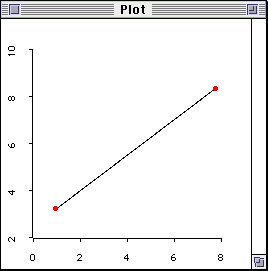The Random House definition:
1. capacity for learning, reasoning, understanding, and similar forms of mental activity; aptitude in grasping truths,relationships, facts, meanings, etc. 2. manifestation of a high mental capacity 3.the faculty of understanding.
The Merriam-Webster defintion of intelligence:
a (1) : the ability to learn or understand or to deal with new or trying situations : reason; also : the skilled use of reason(2) : the ability to apply knowledge to manipulate one's environment or to think abstractly as measured by objective criteria (as tests)
My definition of intelligence:
The ability to correlate at least two previously unconnected points.

"Ummm, two LEDs carrying a ladder?"
Timothy Leary described the growth of a child's symbol manipulation skills as laryngeal-manual development, referring to the use of the voice and the hands as the primary conductors of symbolism. Many people use the word intelligence to describe how well a person uses these muscles. Sure, how well a person communicates will limit the information being transmitted. But the thinking that goes behind the scenes, the stuff to be communicated... It's fairly rare that an adult human encounters a situation where she requires intelligence. Memory and rote learning are usually enough to get us through the day. But think about the times you have used intelligence. Playing football, you keep putting the ball over the crossbar when taking shots on goal. You find that your successful shots depend on you placing your left foot next to the ball, and keeping your right foot toe down. This can now be committed to memory to consistently improve your shot.  Geekiest kickass footballer ever
Geekiest kickass footballer ever
Einstein drew new correlations between mass and energy, space and time.  Best thing about complex physics? The awesome TRON diagrams
Best thing about complex physics? The awesome TRON diagrams
C.L. Sholes found a relationship between the arrangement of letters and typing speed, thus creating the QWERTY typewriter.
Intelligence is a skill. All skills require the input of patterns from which future choices can be made, known as engrams. Wikipedia definition of engram:
Engrams are a hypothetical means by which memory traces are stored as biophysical or biochemical changes in the brain (and other neural tissue) in response to external stimuli.
Although a hypothetical idea, I find engrams useful for compartmentalizing skill blocks when learning. 
Rock climbing has a number of different styles, one of which is crack climbing, as above. You may notice she has her hands in a crack, duh. Now, let's say she has climbed several routes like the one above. Perhaps this one:

and this one:

You can see that all the routes are different, but they all have similarities too; they are all on rock, they all have cracks to climb, they are all vertical. Our climber has built up a decent skill set on cracks; a set of engrams she can call upon whenever she encounters cracks. The more engrams she has to call upon, the more likely her chance of success on any given crack climb. Our climber then encounters this (horrors!): 
Although she has never done a route like this before, her experience and engrams will allow her to make intelligent choices and correlations between her past and present climbs. So too with intelligence. The more problems you can solve, the more goals you achieve, the more experience you will gain, and the more engrams you will develop. All this experience will give you a wider range of options when it comes to your solution. At heart it's the need for a successful result that drives intelligence. To improve your intelligence you must search out problems that need solutions and goals that need achieving, then find the points to correlate for a solution.
References:
http://dictionary.reference.com/browse/intelligence
http://www.merriam-webster.com/dictionary/intelligence
http://en.wikipedia.org/wiki/Engram_(neuropsychology)
No comments:
Post a Comment